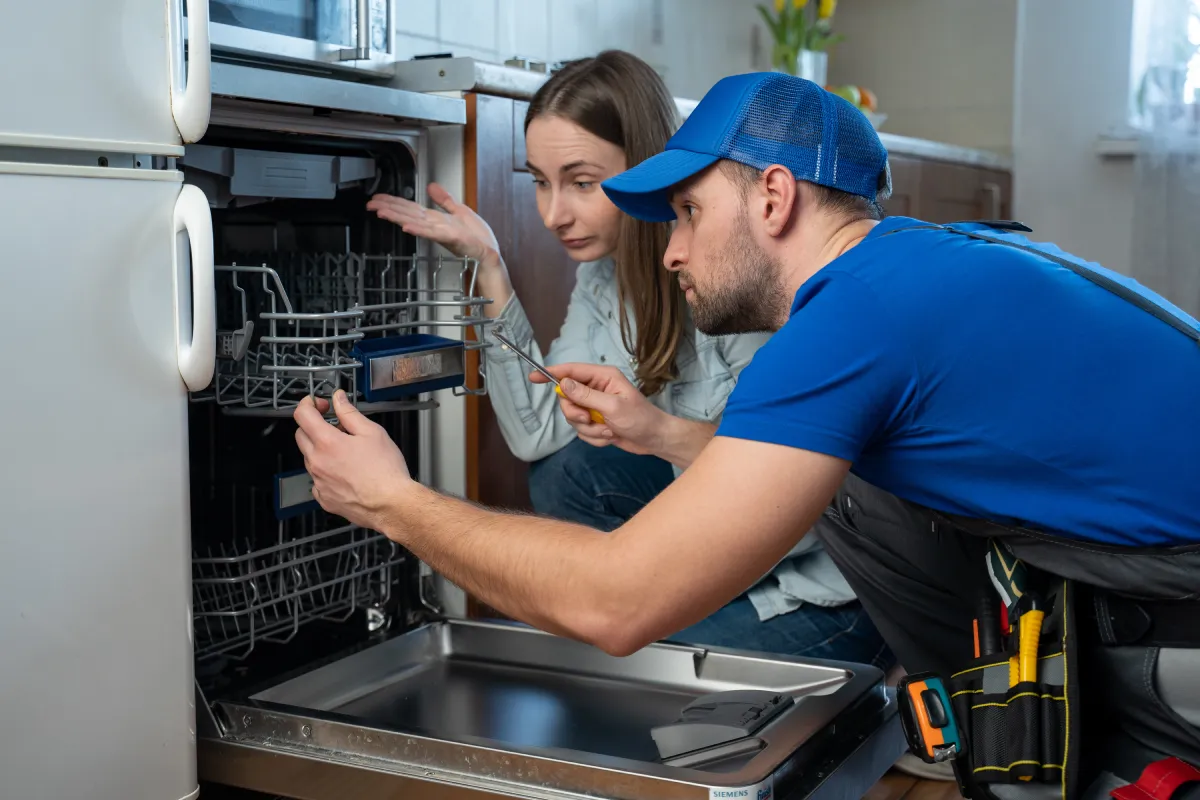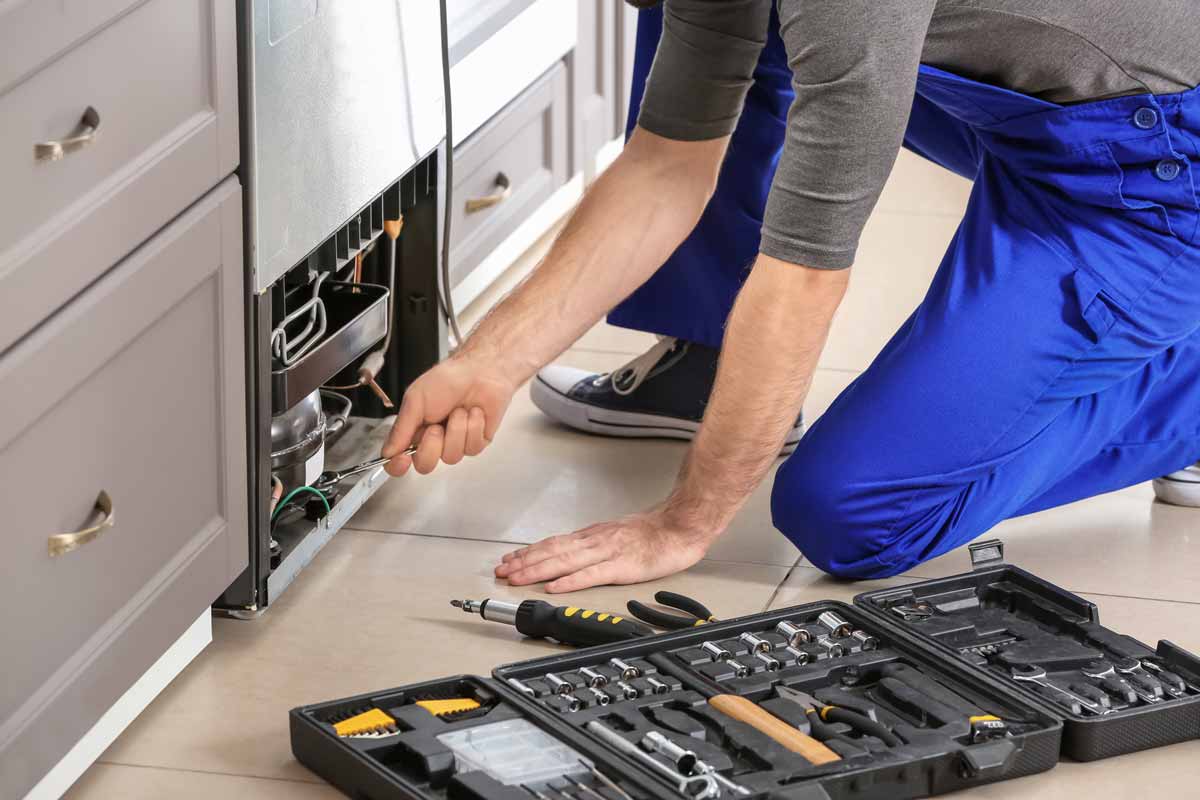Ultimate Guide to Repairing Laundry Appliances – Washer dryer repair service Dependable Refrigeration
Ultimate Guide to Repairing Laundry Appliances – Washer dryer repair service Dependable Refrigeration
Blog Article
The Ultimate Guide to Comprehending Appliance Fixing in your home
When your fridge quits cooling or your stove declines to warmth, it can really feel overwhelming. Understanding home appliance repair at home can save you money and time. You'll discover to identify signs and symptoms, utilize necessary tools, and adhere to an organized troubleshooting process. Before you start, there are crucial safety precautions you need to take into account. What are the most usual troubles, and just how can you fix them? Allow's explore the fundamentals.
Usual Device Troubles and Their Signs
When your home appliances start breaking down, it's vital to recognize the signs early on. Overlooking them can bring about bigger problems and pricey repairs. If your refrigerator isn't cooling properly, you could observe cozy places or condensation developing. This could show a stopping working compressor or a blocked vent.Your dishwasher might reveal issues through dirty meals or unusual noises throughout cycles. If you listen to grinding or clanking, it's time to investigate.A washing maker that won't spin or drain pipes can leave you with soaked laundry, recommending a clogged up drainpipe or a malfunctioning pump.Lastly, if your stove's temperature seems off or it takes forever to pre-heat, you may be handling a defective thermostat. By remaining alert to these signs and symptoms, you can attend to issues prior to they rise right into major repairs.
Crucial Devices for Appliance Fixing
When you're dealing with appliance repair services in your home, having the right tools is crucial. Standard hand tools like screwdrivers and pliers will aid you dismantle and take care of numerous appliances, while electric screening tools guarantee you're functioning securely with electrical wiring. Allow's review what you need to start on your fixing trip.
Basic Hand Tools
Having the right tools is essential for efficient device repair at home. Start with a reliable screwdriver set, including both flathead and Phillips kinds, as screws prevail in device assembly. Pliers are also vital; they assist with gripping, twisting, and reducing wires or tiny elements. A set of needle-nose pliers can reach difficult situations conveniently. You'll require a good flexible wrench for tightening or loosening up nuts and screws. An utility knife comes in handy for cutting via product packaging or insulation. Do not fail to remember a durable workbench or surface to securely organize your devices and parts. With these basic hand tools, you'll be well-prepared to take on most appliance repair work that come your means.
Electric Testing Gadgets
Alongside basic hand tools, electric screening gadgets play a necessary role in appliance fixing. These devices assist you detect electrical concerns and warranty home appliances function safely. A multimeter is essential; it determines voltage, existing, and resistance, allowing you to pinpoint issues promptly. A non-contact voltage tester is another must-have, allowing you spot real-time cords without making straight contact, boosting your safety and security. Clamp meters are wonderful for gauging current flow in cables without detaching them, conserving you time and initiative. In addition, circuit testers can rapidly inspect if electrical outlets are operating properly. By utilizing these devices, you'll improve your troubleshooting process and enhance your repair skills, making device upkeep a lot easier.
Step-by-Step Guide to Diagnosing Appliance Issues
When your appliance acts up, it can be frustrating, however identifying the problem doesn't have to be overwhelming. You'll learn to determine usual issues and apply effective troubleshooting methods. Let's go through the steps to obtain your device back in functioning order.
Usual Appliance Problems

Troubleshooting Strategies Explained

Repairing Major Kitchen Devices: A Closer Look
Have you ever asked yourself how to deal with common concerns with your kitchen home appliances? Fixing major cooking area appliances like refrigerators, stoves, and dishwashers can be less complicated than you think. Beginning by determining the trouble-- whether it's a fridge not cooling down or a stove that won't warm. Typically, a straightforward reset or examining the source of power can address the issue.For fridges, clean the condenser coils and check the door seals. If your oven's not heating, evaluate the heating element and thermostat. Dishwashers could just need a tidy filter or a reset to get them back at work. Always unplug the home appliance before diving into repair work to ensure your safety.Don' t fail to remember to seek advice from the user handbook for details troubleshooting tips connected to your version. With a little bit of perseverance and the right tools, you can with confidence take on device fixings and save cash in the procedure!

Fixing Washing Equipments: Tips and Techniques
When your washing appliances start acting up, it can feel frustrating, but troubleshooting them doesn't have to be an inconvenience. Begin by examining the power supply. Confirm the appliance is connected in and the outlet is working. Next, check the door or cover switch; a defective button can prevent the machine from operating.For washing machines, if it's not rotating, look for out of balance lots. Redistributing the clothing may solve the concern. If your clothes dryer isn't home heating, tidy the dust filter and check the vent for blockages.Listen for uncommon sounds; they can show a trouble. If your device is dripping, examine the hoses for cracks or loosened links. Record any mistake codes shown on digital displays, as they can guide you in determining the concern. Speak with the customer handbook for certain fixing ideas associated to your design.
Security Preventative Measures to Take During Fixes
Before you begin any appliance fixings, it's necessary to focus on safety and security to avoid mishaps or injuries. First, disconnect the appliance or shut off the circuit breaker to guarantee no power reaches it while you function. Usage protected devices to reduce the danger of electric shock. Use safety and security goggles and handwear covers to safeguard yourself from sharp edges or debris (Washer dryer repair service Dependable Refrigeration).Make specific your office is clean and well-lit, so you can see what you're doing. Maintain kids and pets away from the area to prevent distractions and possible dangers. If you're managing gas appliances, be extra mindful; look for leaks prior to proceeding.Take your time, and don't hurry through repair work. If you feel unpredictable regarding any type of step, it's much better to stop and research study than to presume. Following these preventative measures will certainly assist create a more info much safer setting for your do it yourself device repair service job
When to Call a Specialist for Assistance
Exactly how do you recognize if it's time to call a specialist for home appliance fixings? If you've attempted basic troubleshooting without success, it's a clear indicator. If your appliance still won't begin or reveals unusual sounds after resetting it, do not hesitate to seek expert help.When you observe leaks, smoke, or burning smells, prioritize safety and call a pro right away. These issues can bring about even more substantial damages or present risks to your home.Also, if your device is under guarantee, contacting a specialist is frequently the finest course. They can guarantee that fixings will not void your service warranty, saving you money in the long run.Finally, if you're unclear or unpleasant with complex repairs, it's smart to leave it to the experts. Remember, taking on complicated concerns without the best expertise can bring about pricey mistakes. Trust fund a specialist when unsure!
Frequently Asked Inquiries
Exactly How Can I Prevent Appliance Issues in the Future?
To stop appliance troubles in the future, you ought to execute regular maintenance, look for damage, clean filters, and prevent overloading. Staying proactive will certainly help expand their life-span and maintain them running efficiently.
What Are the A Lot Of Typical DIY Device Repair Mistakes?
You may forget security preventative measures, miss troubleshooting actions, or make use of wrong tools when trying do it yourself device fixings. Rushing the procedure or ignoring producer standards can bring about even more significant problems and expensive errors. Stay client and notified!
Just how Do I Know if a Component Requirements Replacement?
You can inform if a component requires replacement by looking for uncommon noises, leaks, or irregular efficiency. If the device struggles to run appropriately or reveals noticeable damages, it's likely time for a replacement.
Can I Utilize Generic Components for Home Appliance Services?
Yes, you can utilize generic parts for home appliance fixings, yet determine they're suitable - Washer dryer repair service Dependable Refrigeration. Common components could conserve you money, however they can affect efficiency or longevity, so evaluate your alternatives very carefully prior to deciding
What Service Warranties Cover Device Fixes?
The majority of appliance guarantees cover repair work for making defects, but they commonly exclude damage from misuse. Inspect your service warranty terms very carefully, as some may need making use of licensed service technicians and initial components for coverage to stay valid.
Report this page